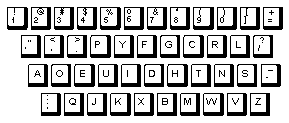 I decided that trying to summarize Why is the Diagnostic and Statistical Manual of Mental Disorders so hard to revise? Path-dependence and "lock-in" in classification in the last post [a curious inertia…] was too much, but rereading it this morning, I changed my mind. Independent from how the DSMs came into being, this article has something to say about any future attempts to change it no matter what changes are proposed [and changing it yesterday would be absolutely okay with me]. As Allen Frances tweeted about this article, "DSM is so hard to change not because it’s right – it’s that every change has harmful unintended consequence."
I decided that trying to summarize Why is the Diagnostic and Statistical Manual of Mental Disorders so hard to revise? Path-dependence and "lock-in" in classification in the last post [a curious inertia…] was too much, but rereading it this morning, I changed my mind. Independent from how the DSMs came into being, this article has something to say about any future attempts to change it no matter what changes are proposed [and changing it yesterday would be absolutely okay with me]. As Allen Frances tweeted about this article, "DSM is so hard to change not because it’s right – it’s that every change has harmful unintended consequence."
Actually path-dependence and lock-in aren’t two separate things, but two parts of the same process. The article brings up an interesting example – the QWERTY keyboard…
| FLASH! |
| I typed the above when I got up, and then set off on a busy morning. When I got home from my busy morning, I did what old men do after a busy morning [boring or not]. When I woke up, I checked my messages and found this one. This paper is available on the Internet after all. Thanks to Rachel Cooper for posting it and to Antipaxos for sending it my way. Obviously, my follow-up just got a lot easier to write. I’ll finish my paragraph and move on…
|
|
Antipaxos
June 10, 2015 | 4:23 PM | Dr. Rachel Cooper provides a preprint of her article here. |
 I’m a self-taught typist with a spastic technique. I actually look at the keyboard, so I never knew why the keyboard is laid out so oddly. But in the day, fast typists could jam up pretty easily if the keybar from the last letter isn’t out of the way of the next. So the keyboard layout is designed to put keys that frequently follow each other in words far apart. Very clever! Now, that doesn’t matter with the computer keyboards, but because all jillion of you real typists out there would rise up in arms if it got changed to the Dvorak layout, it stays the same – QWERTY. And if there were a major revision of the DSM, the administrative and actuarial changes would fall into the "Y2K" range. If I may be allowed an editorial comment, the third party carriers don’t trust us to make
I’m a self-taught typist with a spastic technique. I actually look at the keyboard, so I never knew why the keyboard is laid out so oddly. But in the day, fast typists could jam up pretty easily if the keybar from the last letter isn’t out of the way of the next. So the keyboard layout is designed to put keys that frequently follow each other in words far apart. Very clever! Now, that doesn’t matter with the computer keyboards, but because all jillion of you real typists out there would rise up in arms if it got changed to the Dvorak layout, it stays the same – QWERTY. And if there were a major revision of the DSM, the administrative and actuarial changes would fall into the "Y2K" range. If I may be allowed an editorial comment, the third party carriers don’t trust us to make  reasonable treatment recommendations. Instead they force us to squeeze patients into these often ill-fitting categories with somewhat fixed coverage. The profoundly depressed Melancholic and the situationally depressed may have the same coverage – a silly use of a Dx category…
reasonable treatment recommendations. Instead they force us to squeeze patients into these often ill-fitting categories with somewhat fixed coverage. The profoundly depressed Melancholic and the situationally depressed may have the same coverage – a silly use of a Dx category…
An easy to understand history of DSM development is outlined in Kirk and Kutchins “The Selling of DSM–The Rhetoric of Science in Psychiatry”.
I can’t tell you how great I think that subtitle is. It still applies today to the neuroscience movement and RDOC.
Tunnel vision in psychiatric education is bothersome because it is practiced by people who probably consider themselves somewhat immune to tunnel vision. An obvious example that comes to mind is the lack of psych residency education in psychometrics. Is there one question on the psychiatry boards or recerts about the MMPI or PAI or the various types of intelligence and neuropsychological tests? This is really a damn shame, since (some of) these tools are really the most objective markers we have in a field supposedly hungry for objective markers. If “neuroscience” produces a disorder marker more valid and reliable that the MMPI or PAI or even something as basic as the Cognistat in the next twenty years, I will be surprised. I don’t hear ophthalmologists talking about how they don’t need to understand refractions because optometrists do most of that.
I would add the Rorschach Perceptual-Thinking Index to the mix– proven to be the best measure of problems with thinking and perception available– and an index that does better than the MMPI and PAI (self-report measures) in predicting the “progression” to a full blown primary psychotic disorder in late adolescent and young adult samples.
Yeah– and the Rorschach and MMPI were routinely and thoroughly disparaged in my MFT Masters program, though we certainly did study them, and there were questions about the MMPI in the prep course for our licensing exam. (I can’t discuss the exam itself, of course.)
The MMPI was routinely dismissed as being a racist tool of oppression, but many of us were fascinated by it– and terrified. Some of us gave it to ourselves and became convinced we were psychotic, even though we knew the results would be completely invalid.
I wonder if the MMPI has lost some of its edge because people are so used to taking stupid polls on the Internet– you know, they might approach it like something from Survey Monkey. Just answering a series of questions has a different meaning than it did even a few years ago. Subjects might respond based on how they thought it would impact their credit rating, or how many “likes” they would get if they answered the questions correctly. (Sorry, that was cyinical.)
Very much enjoying Cooper’s paper, will read it more thoroughly over the weekend.
I just don’t understand why in research you wouldn’t want to use tools that would exclude subjects who overreport, underreport or attempt to deny normal faults over an elementary self report inventory as brain dead as the PHQ-9. We can do so much better. Reducing noise is pretty damn important when you are dealing with fuzzy sets and open concepts.
Actually I kind of do understand, and it’s what drives me to post on this and other blogs. The reason is that there are few negative consequences for bad research. Which is the norm and the replication data bears that out.
I’m not a pharmascold, I’m a junk science scold.